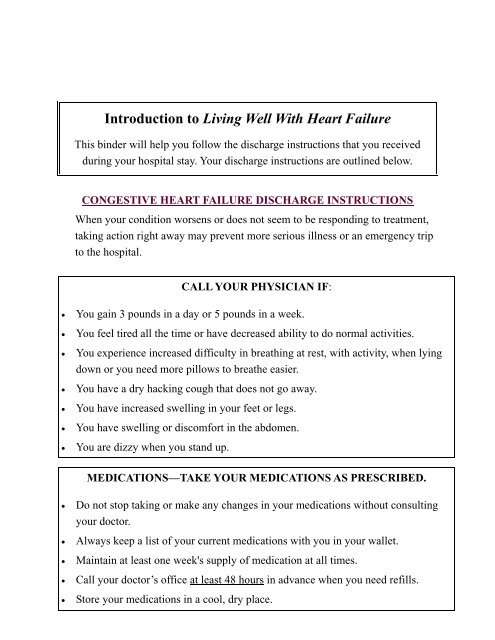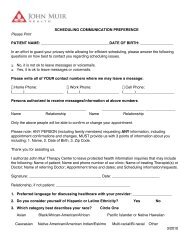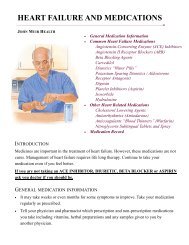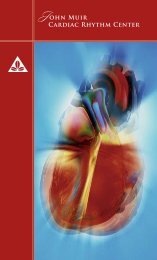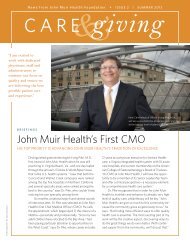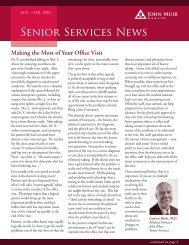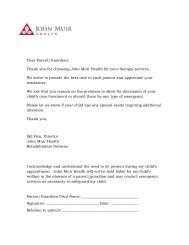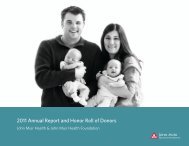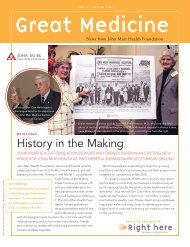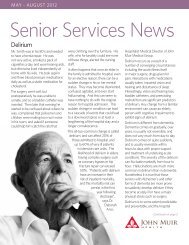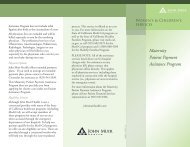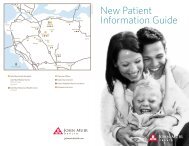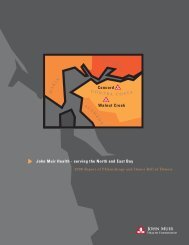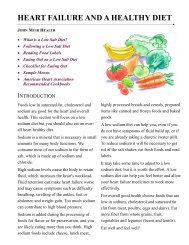Introduction to Living Well with Heart Failure - John Muir Health
Introduction to Living Well with Heart Failure - John Muir Health
Introduction to Living Well with Heart Failure - John Muir Health
- No tags were found...
Create successful ePaper yourself
Turn your PDF publications into a flip-book with our unique Google optimized e-Paper software.
<strong>Introduction</strong> <strong>to</strong> <strong>Living</strong> <strong>Well</strong> With <strong>Heart</strong> <strong>Failure</strong>This binder will help you follow the discharge instructions that you receivedduring your hospital stay. Your discharge instructions are outlined below.CONGESTIVE HEART FAILURE DISCHARGE INSTRUCTIONSWhen your condition worsens or does not seem <strong>to</strong> be responding <strong>to</strong> treatment,taking action right away may prevent more serious illness or an emergency trip<strong>to</strong> the hospital.CALL YOUR PHYSICIAN IF:• You gain 3 pounds in a day or 5 pounds in a week.• You feel tired all the time or have decreased ability <strong>to</strong> do normal activities.• You experience increased difficulty in breathing at rest, <strong>with</strong> activity, when lyingdown or you need more pillows <strong>to</strong> breathe easier.• You have a dry hacking cough that does not go away.• You have increased swelling in your feet or legs.• You have swelling or discomfort in the abdomen.• You are dizzy when you stand up.MEDICATIONS—TAKE YOUR MEDICATIONS AS PRESCRIBED.• Do not s<strong>to</strong>p taking or make any changes in your medications <strong>with</strong>out consultingyour doc<strong>to</strong>r.• Always keep a list of your current medications <strong>with</strong> you in your wallet.• Maintain at least one week's supply of medication at all times.• Call your doc<strong>to</strong>r’s office at least 48 hours in advance when you need refills.• S<strong>to</strong>re your medications in a cool, dry place.
DISCHARGE INSTRUCTIONS CONTINUED:FOLLOW UP—ALWAYS KEEP YOURDOCTOR’S APPOINTMENTS AFTER YOUARE DISCHARGED.• Call your doc<strong>to</strong>r’s office if you have anyquestions or concerns about your treatmen<strong>to</strong>nce you are discharged.• You should see your doc<strong>to</strong>r 1-2 weeks afteryou are discharged. If you don’t have anappointment scheduled <strong>with</strong> your doc<strong>to</strong>rwhen you leave the hospital, you need <strong>to</strong> calland make an appointment for follow up.WEIGHT MONITORING—TOMONITOR HEART FAILUREAND FLUID RETENTION:• Weigh yourself EVERY morningat the same time after youurinate. Do not wear shoes orslippers.• Keep a record of your dailyweight.DIET—AVOID FOODS THAT ARE HIGHIN SODIUM (SALT).• Examples are regular canned soups, pota<strong>to</strong>chips, saltines, bacon and most frozen mealsand entrees.• Do not use salt in food preparation or <strong>with</strong>your meals.• Check food labels for sodium (salt) content.Use products marked “low salt” or “no salt”.• When dining out ask that your order beprepared <strong>with</strong>out salt.• Do not use salt substitutes. You may use"Mrs. Dash" or "Papa Dash" seasoning.• Limit excessive fluid intake. Your doc<strong>to</strong>r willinform you if there is a limit <strong>to</strong> how muchyou can drink each day.NO SMOKING: Resourcesare listed in the lastchapter or contact yourPrimary Care Physician.ACTIVITY:• Resume normal daily activities as<strong>to</strong>lerated.• Check <strong>with</strong> your doc<strong>to</strong>r about anexercise program or enrolling inCardiac Conditioning classes.• Pace yourself. Give yourselfenough time <strong>to</strong> get things done.• Avoid activity after meals or whenthe weather is very hot.• Ask your doc<strong>to</strong>r if you may have alcohol.
FOLLOW THIS CHART TO ASSESS HOW YOU ARE DOING ANDWHEN TO CALL THE DOCTORGREEN ZONE: ALL CLEAR• No shortness of breath• No swelling• No weight gain• No decrease in your activity levelGreen Zone Means:• Your symp<strong>to</strong>ms are under control• Keep taking your medications asdirected by your doc<strong>to</strong>r• Weigh yourself daily• Eat foods that are low in salt• Keep all your medical appointmentsYELLOW ZONE: CAUTION• Weight gain of 3 or more pounds in aday• CoughingYellow Zone Means:• Your medications may need <strong>to</strong> beadjusted• Call your health care professional• More swelling• More shortness of breath when active• Sleeping on more pillows• Anything else unusual that bothers youRED ZONE: DANGER• Shortness of breath all the time, even atrest• Chest pain that doesn’t go awayRed Zone Means:• Call your physician right away (besure <strong>to</strong> tell the office staff that you arehaving any of these symp<strong>to</strong>ms)• Wheezing or chest tightness at rest• Weight gain or loss of more than 5pounds in less than one week• Confusion• Not able <strong>to</strong> perform normal activitieslike showering, cooking or dressing


